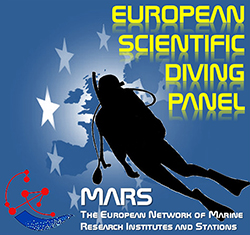– Legal status of scientific diving (see definition on the ESDP web site)
There is a professional certification for “diving scientists” [Certificat d’Aptitude à l’Hyperbarie – CAH, mention B] defined by law [Decree n° 2011-45 ETST1023798D of January 11th, 2011]. For foreign scientists who don’t have a CAH, it is necessary to hold a professional scientific diver (SD) certificate issued by a relevant national SD authority and a written authorization of their employer. Certificates that comply with the ESD and AESD standards are generally accepted, but a check-out dive is a common practice for new members joining a SD team.
– Medical examinations
Medical examinations obtained in other countries apply also in France, as long as they comply with the local level of scrutiny. The examinations for professional diving are generally valid for 12 months, but in special cases hyperbaric physicians may extend the validity up to 5 years (e.g. blood, spirometry, hearing, ECG). The validity period must cover all of the planned days/weeks/months of stay.
– Insurance
As an employee occupying a scientific position in a French laboratory you are covered by a statutory accident insurance throughout the duration of your contract. In all other cases a SD must be covered by an insurance that does not exclude risks of professional diving. Do not forget to remind the employer to declare your work profile to the insurance company to avoid any penalty fees. In all other cases the SD must get a specific accident insurance covering the risks of professional diving. Colimpha (see below), the French association of scientific divers, can provide insurance covering risks specific to the practice of diving (except apnea).
– Decompression issues
The choice of the decompression planning method depends on the diving techniques to be used and is for the team leadership to decide, based on a risk assessment. In France, the reference decompression tables are those annexed to the decree n° MTRT1901237A of May 14th, 2019 (Journal officiel of May 24th, 2019) relating to hyperbaric work carried out in underwater environment. However, diving computers, embedding an algorithm compliant with reference tables, may be used depending on acceptance of the French employer.
– First Aid
All divers must have a valid first aid (CPR) qualification for treating diving casualties. Dive mission leaders need to have an advanced level qualification. All SD team members also need to have a training for all the first aid equipment available, including oxygen administration to diving accident casualties.
– Scientific Diving Procedures
General SD procedures are defined by law [Decree n° MTRT1901237A of May 14th, 2019]. Instructions on procedure and rules for archaeology are detailed in the ministerial order n° MCCC1610914A of April 21st, 2016.
Collection Permits: in France, collecting samples by diving require prior authorization delivered by governmental competent authorities (Maritimes Affairs).
In all cases, visitor scientists are invited to seek advice from the local diving officer. All their dives will be carried out under the responsibility of a hyperbaric operations manager who will ensure the proper application of the rules.
– Breathing gas
Air diving limit for SD depends on the risk assessment and the divers’ qualification. The French SD certificate allows diving down to 50 meters with air; however mixed gases can be used at any depth and must be used for greater depth. Mixed gases or pure oxygen may be used according to specific qualifications and risk assessment.
– Volunteers
Non SD certified volunteers are currently not accepted.
An exception is made for the employment of volunteers in the context of an archaeological workcamp. The DRASSM may grant a temporary authorisation.
– More information
The coordinating body for French SD is the CNPS (Comité National de la Plongée Scientifique). For any further questions concerning SD in France, please contact us.
• Gérard Thouzeau: gerard.thouzeau[at]univ-brest.fr (Chairman of the CNPS):
You can also contact:
• Jean-Pierre Féral: jean-pierre.feral[at]imbe.fr (Chairman of the ESDP – European Scientific Diving Panel)
• Catherine Perrette: catherine.perrette[at]gmail.com (Secretary of the Colimpha, Association Française des Plongeurs Scientifiques)
• Sébastien Legrand: sebastien.legrand[at]culture.gouv.fr (hyperbaric control – DRASSM – Département de recherches archéologiques subaquatiques et sous-marines)
Download the article (in CNPS newsletter n°5 – December 2019, pp.15-17)
